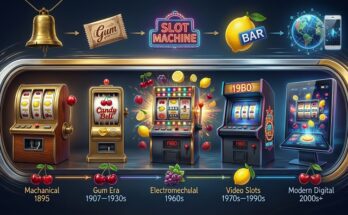The online gambling industry has experienced exponential growth in recent years, driven by technological advancements that have transformed both the way games are played and how players engage with platforms.
Among the most innovative of these advancements is the integration of Artificial Intelligence (AI) into game design. AI is revolutionizing how online casinos approach game creation, optimization, and personalization, bringing new levels of efficiency and excitement to players. From smarter algorithms to dynamic game mechanics, AI is not only reshaping the gaming experience but also influencing broader industry trends, such as security measures and consumer behavior.
AI-driven game design takes advantage of machine learning, data analytics, and neural networks to enhance every aspect of game development.
Whether it’s tailoring game content to individual preferences, ensuring fair play, or analyzing vast amounts of player data to optimize the user experience, AI is pushing the boundaries of traditional gaming models.
As online casinos continue to evolve in a competitive market, AI provides the tools needed to stay ahead by offering personalized experiences and dynamic interactions that traditional game designs could never achieve.
In this article, we will delve into how AI is transforming game design in online casinos, highlighting its applications, benefits, and what the future holds for this exciting fusion of technology and entertainment.
What is AI-Driven Game Design?
AI-driven game design refers to the use of artificial intelligence technologies to create, improve, and optimize online casino games.
These AI techniques can be applied in numerous ways, from personalizing gaming experiences to enhancing gameplay mechanics and improving player engagement.
AI helps automate complex processes, making it easier for developers to create more immersive and engaging gaming experiences for players.
AI in game design often leverages machine learning (ML), neural networks, and natural language processing (NLP), all of which allow casinos to adapt the game experience based on the player’s preferences and behaviors.
How AI Enhances Online Casino Games
1. Personalized Gaming Experience
A major benefit of AI in online casinos is its capacity to provide personalized gaming experiences. By examining a player’s behavior, preferences, and history, AI systems can develop tailored experiences for each individual.
For instance, if a player often plays blackjack, AI can suggest other related card games that match the player’s interests.
Personalization extends to in-game experiences as well. AI can adjust the difficulty level of games based on a player’s skill level, creating an experience that feels challenging without being overwhelming. This adaptability helps keep players engaged and encourages longer playing sessions, which can lead to higher retention rates.
2. Real-Time Game Adjustments
One of the most fascinating applications of AI in online casinos is its ability to make real-time game adjustments.
Unlike traditional game designs, which offer a fixed set of rules and mechanics, AI allows games to adapt dynamically to player behavior and preferences as the game progresses.
This feature is a game-changer because it leads to a more personalized, engaging, and immersive experience for players.
Adapting to Player Skill Levels
AI can analyze a player’s skill level and adjust game difficulty accordingly, providing a balanced experience that caters to both beginners and experienced players.
For example, in card games like blackjack or poker, AI can monitor how often a player wins, how they make betting decisions, and their understanding of game strategy.
If the player struggles with certain aspects of the game, the AI might introduce tutorials or tips to guide them through more challenging situations.
Alternatively, for advanced players, the AI might increase the game’s complexity. It could introduce more complicated game mechanics or adjust the behavior of virtual opponents, making them more challenging and unpredictable.
This way, AI ensures that the game remains fun and exciting, regardless of player’s experience level. This is particularly important for online casinos, where attracting and retaining players is highly competitive.
Personalized experiences are crucial to keeping players engaged and coming back for more.
Customizing Game Speed
Another way AI makes real-time adjustments is by optimizing game speed. While some players prefer quick, fast-paced gameplay, others may enjoy a slower, more deliberate pace. AI can track how quickly a player makes decisions and adjust the game’s speed to align with their preferences.
For example, if a player is taking a bit longer to place their bets or make strategic moves, AI can slow down the game to give them more time to think. Conversely, if the player makes fast, confident decisions, AI can speed up the game to maintain excitement.
This customization is essential in games like roulette or slot machines, where players’ reactions and decisions might not follow a fixed pattern. AI enhances player experience by tailoring the game’s flow to suit individual preferences.
Adapting to Player Behavior and Betting Patterns
AI is also extremely effective at recognizing and responding to player behavior and betting patterns in real-time.
For instance, AI algorithms can track how often players change their betting style, whether they prefer to bet conservatively or take bigger risks, and how they react to losses or wins.
Suppose a player tends to increase their bets after a losing streak. In that case, the AI may respond by adjusting the rewards and risk dynamics of the game to either counterbalance the player’s behavior or encourage them to try different strategies.
3. Dynamic Content Creation
AI-driven game design can also be used to generate dynamic content within casino games. For example, AI can alter visual elements, music, and sound effects to suit a player’s preferences.
The music might change to match the player’s emotional state or past game outcomes, creating a more immersive and personalized experience.
Moreover, AI can create new and innovative game features that weren’t initially planned.
For instance, AI systems can analyze player data to identify trends or patterns that might inspire the development of new game mechanics, bonus features, or entire game modes that resonate more with players.
AI’s Role in Game Fairness and Security
Fairness is a critical concern in the world of online gambling. Players need to trust that the games they are playing are not rigged or manipulated. AI can play a significant role in ensuring fairness by continuously monitoring games for irregularities and potential cheating.
AI systems use machine learning to detect any abnormal patterns that might indicate foul play. For example, if certain players are consistently winning under suspicious circumstances, AI can raise an alert for further investigation. AI can also monitor betting patterns to detect collusion in poker games, where players might work together to manipulate the outcome.
Enhancing Fraud Detection
Online gambling sites are susceptible to various types of fraud, including identity theft, payment fraud, and bonus abuse. AI algorithms can help detect and prevent fraudulent activities by analyzing large datasets in real-time to identify unusual or malicious patterns.
For instance, AI can analyze player behavior to determine if a player is using stolen credit card details or if a bonus offer is being exploited. AI-driven fraud detection systems have the advantage of quickly learning from new fraudulent tactics, improving their ability to identify and stop fraud before it becomes a problem.
Legal Online Gambling in the USA
The legal landscape of online gambling in the USA is complex, with regulations varying by state. While federal laws prohibit some forms of online gambling, many states have legalized and regulated online casinos and sports betting.
As of now, as this web source informs, online gambling is legal in several states, and the number is increasing as more states recognize the potential for tax revenue and consumer demand.
States like New Jersey, Pennsylvania, and Michigan have established regulated online gambling markets, providing players access to various online casino games.
Each state has its own regulatory framework for licensing operators, ensuring player safety, game fairness, and financial transparency.
Online Casino Licensing and Regulation
In states where online gambling is legal, operators must obtain licenses from state regulators to offer real-money gaming. These licenses ensure that online casinos meet strict criteria regarding game fairness, security, responsible gambling practices, and financial transparency.
For instance, the New Jersey Division of Gaming Enforcement (DGE) oversees online casinos in the state and ensures that operators comply with all legal requirements. Similar regulatory bodies exist in other states where online gambling is legal.
Consumer Protection in Legalized Online Gambling
With the growth of online gambling, consumer protection has become a top priority for regulators. In regulated markets, AI and other technologies are used to enhance consumer protection by ensuring that games are fair and players’ personal information is secure.
State-regulated online casinos must also implement responsible gambling measures, such as self-exclusion programs and the ability for players to set deposit limits. AI can help automate and personalize these measures by detecting signs of problematic gambling behavior, such as a sudden increase in bet sizes or prolonged gaming sessions, and offering players appropriate tools to manage their behavior.
AI and Game Development Efficiency
AI is playing an important role in improving the efficiency of game development. Traditionally, game testing has been a time-consuming and costly process.
AI-driven testing tools can automate this process by running simulations to identify bugs, glitches, and inconsistencies in game mechanics.
AI can simulate countless scenarios, testing every possible outcome much faster than human testers can.
As a result, game development cycles become quicker, leading to a more refined final product that advantages both developers and players.
Streamlining Game Design and Prototyping
In addition to testing, AI can help speed up the game design process. Developers can use AI-driven tools to generate game prototypes, test different design elements, and iterate on game concepts quickly. AI can also help optimize game mechanics based on player feedback and behavior, ensuring new features appeal to a broad audience.
By automating many repetitive tasks in game design, AI allows developers to focus on creative aspects, leading to more innovative and engaging gaming experiences.
The Future of AI in Online Casino Game Design
As AI technology advances, the future of AI-driven game design in online casinos is auspicious. We can expect even more personalized experiences, with AI learning to predict player preferences and offer highly tailored gaming experiences.
Furthermore, AI will likely play a more significant role in live dealer games, with real-time AI-driven enhancements such as personalized chatbots, dynamic game environments, and advanced fraud detection systems.
AI may also open the door to more immersive and interactive gambling experiences, such as virtual reality (VR) and augmented reality (AR) integration in online casinos.
AI is also expected to drive more responsible gambling practices, offering players more ways to manage gaming behaviors. AI-powered self-regulation tools could become commonplace, allowing players greater control over their gambling habits.
Conclusion
AI has already begun to transform the online gambling landscape significantly, and its influence is expected to grow even further as technology continues to evolve. Integrating AI into game design reshapes how casinos operate, how games are developed, and how players experience entertainment in the digital age.
AI enhances every aspect of online gambling, from personalizing game experiences to creating dynamic, real-time adjustments based on player behavior. It offers operators and players greater levels of engagement, security, and fairness, paving the way for an entirely new era of gaming.
As online gambling continues to expand, especially in regions where it has been newly legalized, AI will play an essential role in maintaining competitiveness in the marketplace.
With AI-driven game design, casinos can create more immersive, enjoyable, and efficient experiences that adapt to the needs and preferences of individual players.
Moreover, AI’s ability to ensure fair play, improve fraud detection, and promote responsible gambling will contribute to a safer and more reliable user environment.
Looking to the future, combining AI with emerging technologies like virtual reality (VR) and augmented reality (AR) will likely unlock entirely new forms of gaming that we can only begin to imagine.
The future of AI-driven game design in online casinos is undoubtedly bright, promising exciting new developments in how players interact with their favorite games.



